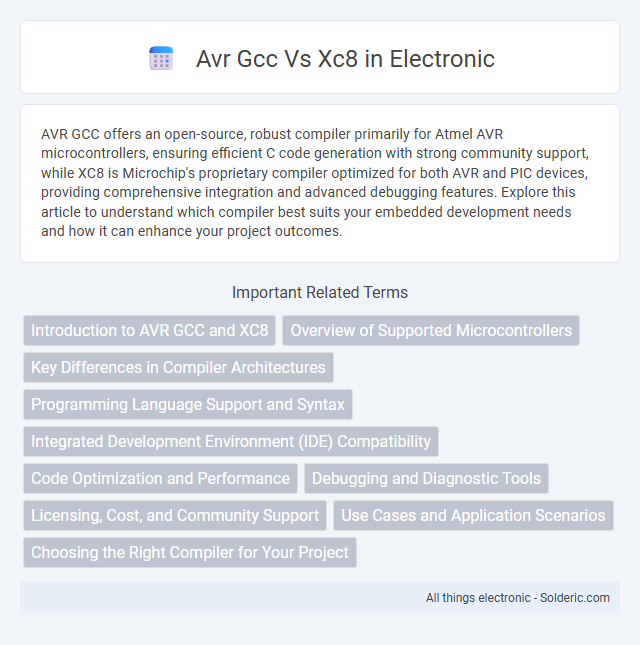AVR GCC offers an open-source, robust compiler primarily for Atmel AVR microcontrollers, ensuring efficient C code generation with strong community support, while XC8 is Microchip's proprietary compiler optimized for both AVR and PIC devices, providing comprehensive integration and advanced debugging features. Explore this article to understand which compiler best suits your embedded development needs and how it can enhance your project outcomes.
Comparison Table
| Feature | AVR GCC | XC8 |
|---|---|---|
| Developer | GNU Project | Microchip Technology |
| Supported MCUs | AVR 8-bit microcontrollers | Microchip 8-bit PIC and AVR microcontrollers |
| License | Open Source (GPL) | Proprietary |
| Optimization | Good general optimizations, customizable via GCC flags | Optimized for Microchip devices, advanced code size and speed optimizations |
| IDE Integration | Atmel Studio, PlatformIO, Makefiles | MPLAB X IDE |
| Debugging Support | Supported via GDB and compatible debuggers | Full debugging with MPLAB X and PIC debuggers |
| Code Size | Typically larger than XC8-generated code | Generally produces smaller code |
| Language Support | C, C++ | C |
| Community & Support | Large open-source community | Official Microchip support and forums |
Introduction to AVR GCC and XC8
AVR GCC is an open-source compiler suite based on the GNU Compiler Collection, tailored for programming Atmel AVR microcontrollers using C and C++. XC8 is a proprietary compiler from Microchip, designed specifically for 8-bit PIC and AVR microcontrollers, offering highly optimized code generation and integrated debugging features. Both compilers support AVR architectures but differ in licensing, optimization capabilities, and development environment integration.
Overview of Supported Microcontrollers
AVR GCC supports a broad range of Atmel AVR microcontrollers, including popular models like the ATmega and ATtiny series, making it ideal for diverse embedded applications. XC8 targets Microchip's PIC microcontrollers, specifically 8-bit PIC MCUs, including PIC10, PIC12, PIC16, and PIC18 families, updated after Microchip's acquisition of Atmel. Developers choose AVR GCC for AVR MCU development due to its open-source nature and wide device support, while XC8 offers optimized libraries and tools specifically for PIC MCUs in industrial and commercial projects.
Key Differences in Compiler Architectures
AVR GCC employs an open-source compiler architecture based on the GNU Compiler Collection, supporting a wide range of AVR microcontrollers with flexible optimization settings. XC8, developed by Microchip, features a proprietary compiler design optimized for PIC microcontrollers and AVR devices, integrating tightly with MPLAB X IDE for enhanced debugging and peripheral support. The key architectural difference lies in AVR GCC's modular, license-free infrastructure versus XC8's closed-source, vendor-specific optimization focus.
Programming Language Support and Syntax
AVR GCC supports C and C++ programming languages, offering extensive libraries and compatibility with standard syntax, enabling efficient development for AVR microcontrollers. XC8 primarily supports C language with specific extensions and optimizations tailored for Microchip PIC devices, offering syntax elements and pragmas designed to simplify embedded programming tasks. While AVR GCC provides greater flexibility with its support for both C and C++, XC8 focuses on ease of use and hardware-specific controls within the C language framework.
Integrated Development Environment (IDE) Compatibility
AVR GCC offers broad compatibility with multiple Integrated Development Environments (IDEs) such as Atmel Studio, Eclipse, and Visual Studio Code, providing flexibility for developers to choose their preferred environment. XC8 is tightly integrated with Microchip's MPLAB X IDE, delivering a streamlined experience optimized for Microchip devices and simplified project management. Your choice depends on whether you prioritize extensive IDE support with AVR GCC or a unified, vendor-specific solution with XC8.
Code Optimization and Performance
AVR GCC offers advanced code optimization features with multiple optimization levels (-O1 to -O3) and support for link-time optimization, enabling highly efficient and compact code suitable for resource-constrained microcontrollers. XC8 provides user-friendly optimization settings targeting size reduction and speed enhancement, but its performance tuning is less granular compared to AVR GCC, potentially affecting execution speed in complex applications. Your choice between AVR GCC and XC8 should consider the trade-off between fine-grained optimization control and ease of use for maximum code performance on AVR devices.
Debugging and Diagnostic Tools
AVR GCC provides robust debugging support through tools like GDB and Atmel Studio integration, enabling source-level debugging and real-time code analysis for AVR microcontrollers. XC8 offers advanced diagnostic features, including MPLAB X IDE compatibility and MPLAB Code Configurator, facilitating streamlined debugging and comprehensive error detection. Your choice between AVR GCC and XC8 should consider the debugging environment preferences and the specific microcontroller architecture to maximize development efficiency.
Licensing, Cost, and Community Support
AVR GCC is an open-source compiler with a free GNU General Public License, offering cost-free usage and extensive community support through forums and documentation. XC8 by Microchip is a proprietary compiler requiring a paid license for full optimization features, though a free limited version is available, with support provided primarily through Microchip's official channels. Your choice depends on whether you prioritize zero cost and broad community resources with AVR GCC or professional backing and integrated Microchip product support with XC8.
Use Cases and Application Scenarios
AVR GCC excels in open-source projects, hobbyist developments, and educational purposes due to its broad community support and compatibility with a wide range of AVR microcontrollers. XC8 is optimized for Microchip PIC and AVR MCUs in professional embedded systems requiring robust compiler optimizations, Microchip-specific libraries, and seamless MPLAB X IDE integration. Both compilers serve distinct niches: AVR GCC for flexible, cost-effective development on standard AVR platforms, and XC8 for commercial-grade applications demanding enhanced code efficiency and vendor support.
Choosing the Right Compiler for Your Project
Choosing the right compiler for your project depends on factors such as target microcontroller, code size optimization, and development environment. AVR GCC offers open-source flexibility and extensive community support for AVR microcontrollers, while XC8 provides Microchip-optimized performance and integrated debugging for PIC devices. Your project's hardware platform and required toolchain features ultimately determine whether AVR GCC or XC8 best suits your development needs.
avr gcc vs xc8 Infographic

 solderic.com
solderic.com